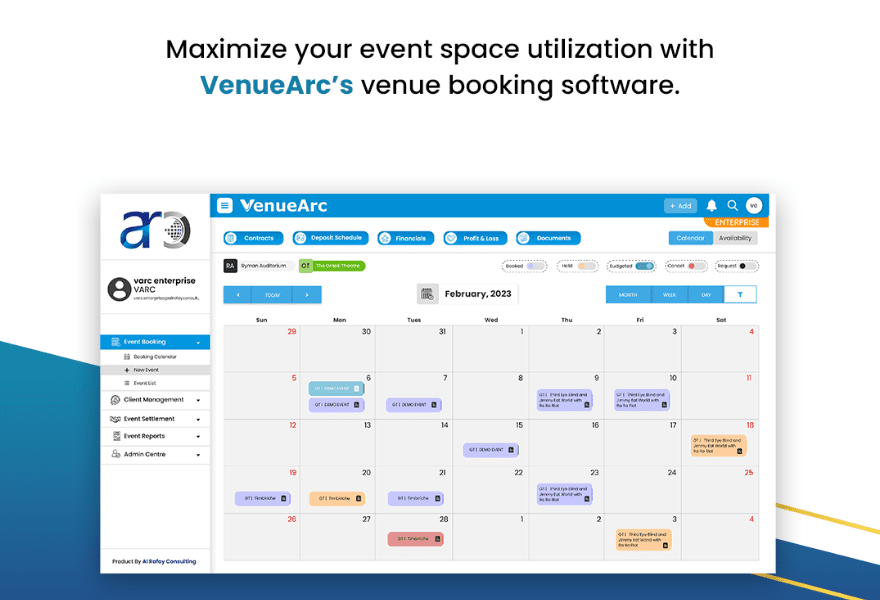
Event management and planning industry has evolved to become an important and fast-paced industry. It has become a long way and it’s success has journeyed upon its efficiency and being well-organized. The, event managers are always on the look to innovate and improve their work by utilizing different modern tech tools.
During their search of making use of technological gadgets they realized that using Customer Relationship Management (CRM) systems can benefit their craft of organizing events greatly. Integration of CRM with event management software has greatly improved their work.
This article explores how event managers are using CRM to streamline their tasks, be more efficient, and create unforgettable experiences for their clients and guests.
1. Building Strong Client Relationships
One of the main advantages of using CRM in event management is better client relationships. Event managers use CRM software to keep all client information in one place, like contact details, event preferences, and past interactions. This helps event managers personalize their services, making clients feel valued.
With CRM, event managers can also keep track of client conversations, send timely emails, and schedule meetings. This keeps clients happy and engaged, which leads to higher satisfaction and trust. By integrating CRM with event management software event managers can keep a close eye on client relationships throughout the event planning process.
2. Making Event Booking Easier
Event booking is a critical part of event management, and CRM systems simplify this process. With event booking software linked to CRM, event managers can handle inquiries, create quotes, and book events efficiently. This system provides quick access to availability, pricing, and contract details.
Creating and sending quotes to clients takes only minutes with CRM, reducing response times and increasing the chances of getting bookings. Moreover, CRM automates booking confirmations and reminders, reducing the risk of double bookings and scheduling conflicts. This automation not only saves time but also improves accuracy and client satisfaction.
3. Effective Lead Management
In the competitive event management field, lead management is vital for business growth. CRM software helps event managers capture, track, and convert leads effectively. Event managers can categorize leads based on their interests, budgets, and event dates.
By using event management software integrated with CRM, event managers can design specific marketing campaigns and personalize outreach for potential clients. This strategic approach increases the chances of converting leads into bookings. As leads move through the sales process, event managers can track their interactions and adapt their communication to meet individual needs, resulting in more successful conversions.
4. Keeping Tasks Well-Organized
Successful events depend on thorough planning and execution. CRM systems equipped with task management tools allow event managers to create and assign tasks to team members, ensuring nothing gets overlooked. Tasks can cover everything from scouting venues and coordinating vendors to managing tickets and marketing activities.
Event managers can set deadlines and priorities for each task, keeping the entire team on the same page. Task management in CRM also enables real-time updates and notifications, making collaboration among team members seamless. This way, event managers can ensure that every aspect of the event is well-coordinated and stays on schedule.
5. Simplifying Contract Generation
Contracts are the backbone of any event management business. CRM systems offer contract generator features that make creating contracts a breeze. Event managers can quickly generate professional contracts by entering client and event details into predefined templates.
These templates can be customized to include specific terms, conditions, and pricing structures. Once generated, contracts can be sent to clients for review and electronic signatures, eliminating the need for physical paperwork and simplifying the approval process. This not only saves time but also reduces the risk of errors in contract documents.
6. Utilizing Data for Informed Decisions
Making decisions based on data is becoming increasingly important in event management. CRM systems provide event managers with valuable insights into client preferences, booking trends, and the effectiveness of marketing efforts. By analyzing data, event managers can make informed decisions to optimize their services and boost profits.
Event management software integrated with CRM lets event managers generate reports on various metrics, such as revenue, attendance, and customer satisfaction. These reports help identify areas for improvement and enable the implementation of strategies to enhance event outcomes. Data-driven insights are invaluable for adapting to market trends and staying competitive in the industry.
Final Word
In summary, integrating CRM systems into event management has transformed the way event managers work. By managing client relationships effectively, streamlining event bookings, enhancing lead management, simplifying task management, and making contract generation easy, event managers can deliver exceptional experiences to their clients and guests.
One CRM solution gaining recognition in the event management industry is VenueArc. It combines the power of CRM with event booking software and contract generation tools, offering event managers a comprehensive platform to manage all aspects of their events seamlessly.
As event management continues to evolve, embracing CRM technology will be essential for staying competitive and exceeding client expectations in this dynamic field.






